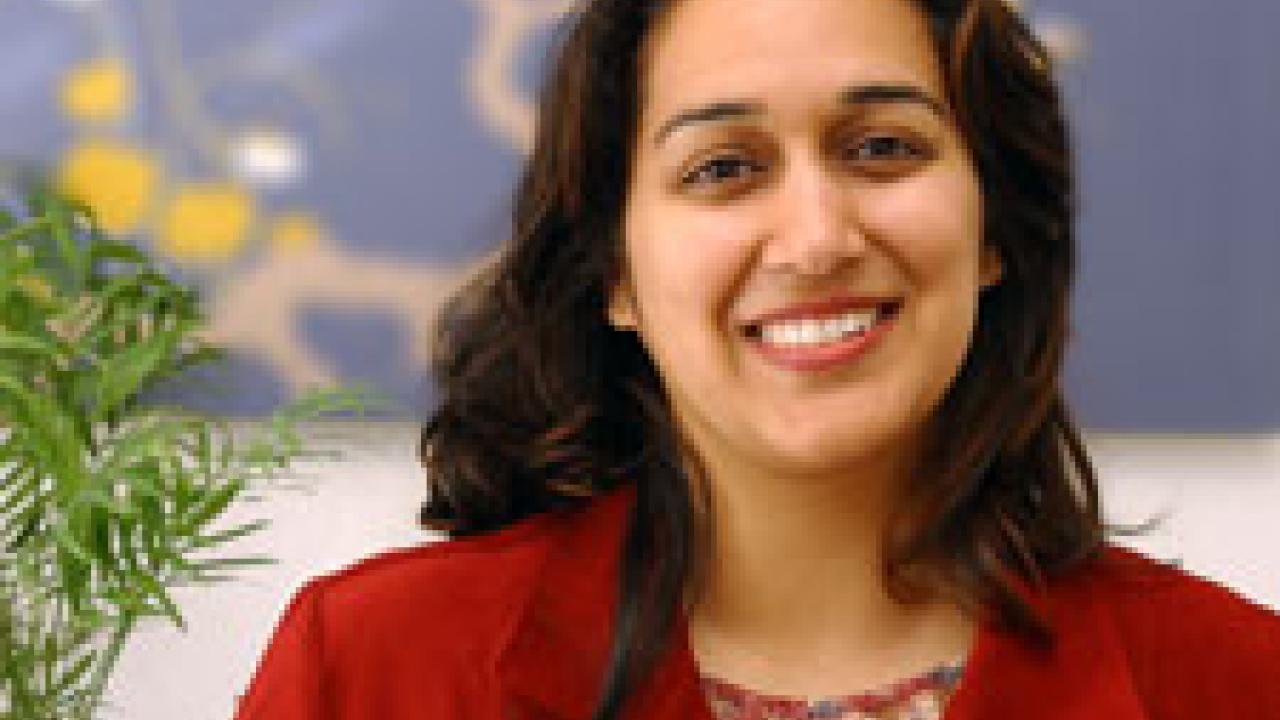Neera Puri talks about moving the field of psychology, and the rest of humanity, into the realm of human joy.
She believes the theory of "positive psychology" is a giant leap forward in that direction.
Puri, a psychology fellow in the Counseling Center on campus, explains that positive psychology builds on a set of human strengths such as courage, optimism, work ethic, hope, honesty and perseverance. "In counseling, this shifts the focus from pathologies and negative problems to pre-existing strengths and a discovery of one's hidden talents," she says.
In her three years at Davis, Puri has counseled hundreds of students and worked with numerous faculty and staff in promoting healthy approaches to university life. Puri, who holds a doctorate in psychology, has examined issues ranging from post-Sept. 11 stereotypes to the psychological impact of outsourcing Silicon Valley jobs offshore.
"Positive emotion serves an evolutionary function that can broaden our intellectual, physical and social resources. Humanity is now on the threshold of an era of good feeling," she says.
With that welcoming tone, Puri's door is proverbially "always open." She dreams of great access to psychological treatment, especially for males and those from ethnic cultures that are somewhat reticent when it comes to acknowledging such needs.
"Whenever the phone rings," she says, "I make sure I answer it if I'm nearby. It could be somebody who struggled with calling for help, and I want to make sure they make that invaluable first contact."
Puri is also a principal of Bay Area Coach, a founding member of the South Asian Psychological Networking Association, and a member of the American Psychological Association. As a "life coach," she frequently counsels business executives who are looking to tap into their potential career-wise.
"Something powerful occurs when you put two people together in a welcoming setting," she says. "Many of us have our own inner wisdom, and through dialogue and a warm mental embrace, the solutions pour forth."
Technology is changing the shape of psychology, she says, and making it easier for some people to initiate treatment. With Internet e-mail, Web bulletin boards, listserves and the omnipresent telephone, Puri says people are increasingly making use of the relative anonymity of these technologies to express themselves in different forms of therapy.
"We've found that people, especially males, enjoy these virtual environments in accessing treatment," Puri says. "One can have instant listening and feedback sessions. It's phenomenal and empowering."
She adds, "What you are thinking determines your behavior."
Puri has given much thought and time to student programs like the UC Davis Multicultural Immersion Program, which involves leadership courses, speakers and activities aimed at fostering an accepting environment. The results are amazing, Puri says.
"Students come up to me and say, 'I'm not sure what happened, but I'm suddenly feeling better about myself and other people,'" Puri says.
Why did you choose a career in psychology?
In college I had a friend who kept everything bottled up, and we did not realize how badly everything was going until it was almost too late. This happens too often. My desire is to encourage the means and ways people can receive the psychological treatment they need.
What's a big issue in student psychology?
Employment is one of the biggest issues for students. From a psychological standpoint, unemployment can feel like a tragedy for young people. Students are under great stress to find good jobs. Contrary to common perceptions, college is not always the easiest time in the world due to a host of issues, from family dynamics to career preparation.
What do you like most about your job?
The university environment is such a rich one with so many different opportunities and people. Above all, I love working with students. They are fascinating. I love walking outside my North Hall office and seeing a protest about something or other in front of the Memorial Union -- young people feeling free to express themselves; that's good.
And the least?
I wish I could go door to door and get more people into our programs. There's a great need out there.
What's something surprising about you that people don't know?
When I was in graduate school, I wanted to make the cultural point that South Asians -- I'm from India, Punjab, to be exact -- are Asians. This has not been as recognized in America as elsewhere in the world. So I entered the Ms. Asia U.S.A. contest and won an award for being the most photogenic.
Read any good books lately?
In Authentic Happiness: Using the New Positive Psychology to Realize Your Potential for Lasting Fulfillment, psychologist Martin Seligman writes that if we focus on our strengths, we can teach ourselves to live more productive, more meaningful lives. He suggests that it's, in fact, the psychoanalyst's focus on our individual problems that perpetuates wallowing in our pain instead of emphasizing what's positive in our lives.
What are your most treasured possessions?
My 5-year-old niece, Shaina, and 9-year-old nephew, Nico. They live in Wisconsin. By the way, I grew up west of Milwaukee.
What's your guilty pleasure?
Beaches and dancing. I dream of exploring all the beaches and all the different dances in the world. Cultures have distinct types of dances. As for beaches, I played sand volleyball in college, and it is a very warm memory, so I associate beaches with a lot of fun.
What is your advice to a world fraught with ethnic and religious differences?
There needs to be more dialogue. When you talk and create a condition of acceptance, many good things are possible. You may not eliminate differences, but you may advance your understanding of something or someone you had not known very well beforehand. It sounds simple, but it is hard -- and worthwhile -- to do. •
